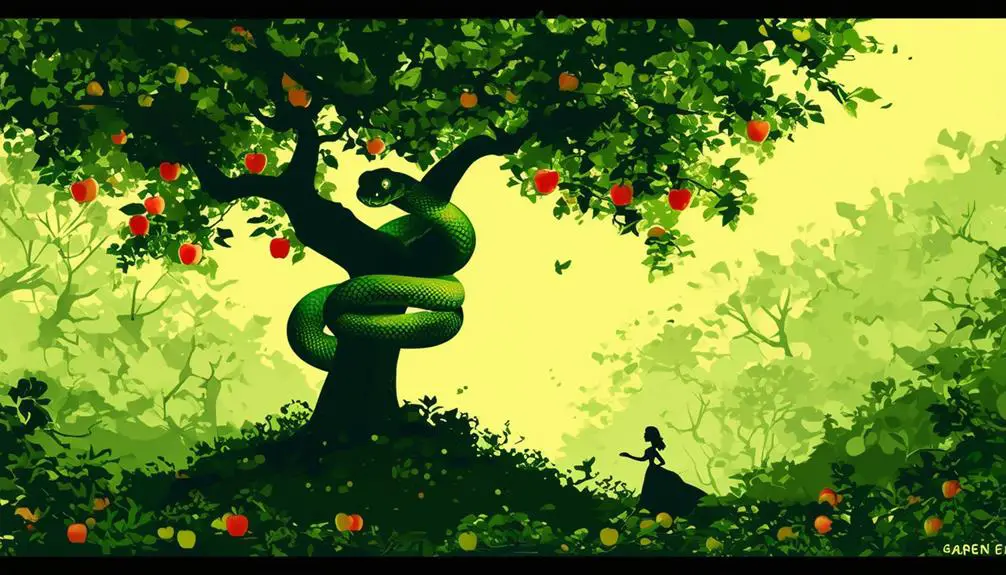Unearth the profound implications of humanity's fall in Genesis Chapter 3, a tale of seduction, sin, punishment, and a glimmer of divine redemption.

Bible Study – The Book of Genesis – Chapter 3 – Summary and Analysis
In Genesis Chapter 3, you witness the pivotal moment of humanity's fall. The Serpent's deception leads to Eve's temptation and Adam's transgression, consequently introducing original sin and signaling a rupture in the divine-human relationship. This chapter illustrates the profound consequences of disobedience, reflected in the tailored punishments meted out. Yet, it subtly hints at the possibility of redemption. As you journey further into this narrative, you'll unravel the intricacies of free will and divine grace, both central to understanding the grand narrative of the Bible.
Key Takeaways
- Genesis Chapter 3 marks humanity's transition from purity to sinfulness through Adam and Eve's disobedience and the introduction of Original Sin.
- The chapter highlights the deceptive influence of the serpent, symbolizing cunning and manipulation, which led to the rupture of humanity's relationship with God.
- This chapter underscores the frailty of human nature, illustrating the far-reaching consequences of temptation, desire, and regret that permeated the narrative.
- God's reaction to Adam and Eve's transgression, balancing wrath and mercy, outlines the consequences and shapes the overarching themes of the Bible.
- The expulsion from Eden symbolizes spiritual descent and humanity's estrangement, setting the tone for the subsequent biblical narrative and introducing the possibility of redemption.
Genesis Chapter 3: Overview

In your exploration of Genesis Chapter 3, you'll encounter a pivotal shift of events in biblical narrative, where the innocence of humanity is lost due to a notorious act of disobedience towards God's command. This chapter often draws the attention of theologians and scholars for its narrative density, especially considering its role in the Creation Interpretation and the concept of Original Sin.
As you investigate further into the text, you'll observe how the chapter illustrates the move from purity to sinfulness, a change that's central to understanding the human condition from a biblical perspective. The concept of Original Sin, as introduced in this chapter, is a cornerstone in Christian theology. It suggests that through Adam and Eve's disobedience, sin entered the world, tainting all of humanity. This notion has significant implications on the understanding of human nature and the necessity of salvation.
Meanwhile, the Creation Interpretation in this setting emphasizes the drastic contrast between the initial divine design and the reality brought about by human disobedience. Despite the apparent simplicity of the narrative, its underpinnings provide a profound insight into the Christian worldview and its interpretation of human nature.
The Serpent's Deceptive Influence
Delving into the narrative, you'll notice the serpent's role as a deceptive influence, a catalyst that propels humanity's fall from grace. The Serpent Symbolism in Genesis 3 is a potent representation of cunning and deception, with the impact of this deception being a key element of the story's unfolding drama.
- Serpent as Symbol: The serpent in Genesis isn't just a snake. It's a symbol of deception and guile, embodying a threat to the innocence and purity of the garden. Its symbolic role is central to understanding the narrative's deeper layers.
- Deception's Influence: Deception is a powerful force in Genesis 3, causing a rupture in the relationship between humanity and God. The serpent's deceptive influence leads to the first act of disobedience, marking a shift from innocence to knowledge, from obedience to rebellion.
- The Impact of Deception: The Deception Impact is profound. It's not just about an individual act of disobedience, but about the introduction of sin into the world, a condition that would have lasting consequences for all of humanity.
Thus, the serpent's deceptive influence serves as a turning point in the narrative, a moment of profound transformation that alters the course of human history.
Eve's Fatal Temptation

Under the serpent's sly influence, we now turn our attention to Eve, whose fatal temptation becomes a pivotal moment in the Genesis narrative. The allure of knowledge persuades her to defy God's command, an act with irreversible repercussions.
The theme of Eve's regret permeates this narrative, revealing a deep sense of remorse for yielding to temptation. It's a poignant reminder of the profound impact our choices can have. Eve's regret, however, isn't just borne out of disobedience, but also from the harsh reality of her actions' consequences.
Temptation's impact is far-reaching, altering the course of human history. Its effects reverberate throughout the narrative, shaping the human condition. Eve's temptation highlights the compelling power of desire and the tragic consequences of yielding to it.
In a broader sense, Eve's fatal temptation underscores the inherent frailty of human nature. It serves as a timeless lesson on the perils of succumbing to allure, the agony of regret, and the enduring impact of our choices. The narrative of Eve's transgression isn't just a tale of temptation and regret but a sobering reflection on the human condition.
Adam's Transgression
Now, let's turn our attention to Adam's transgression. Specifically, we'll examine the incident involving the forbidden fruit and the repercussions of disobedience as depicted in Genesis 3. We'll seek to understand the profound impact of these events on Adam, their implications for humanity, and the theological interpretations that have arisen from them.
The Forbidden Fruit Incident
The incident of the forbidden fruit, often seen as Adam's transgression, marks a pivotal moment in the narrative of Genesis and requires a deep and thoughtful analysis.
- Fruit Symbolism: The fruit, traditionally an apple, symbolizes knowledge, a tantalizing temptation that was too irresistible for Adam and Eve.
- Original Sin: This incident is deemed as the 'original sin', a disobedience that led to the fall of mankind.
- Free Will: This event also exhibits the concept of free will, a divine gift shrouded in responsibility and potential jeopardy.
This episode, laden with profound symbolism and significant theological implications, is a proof to mankind's struggle with temptation, moral boundaries, and the ensuing repercussions of our choices.
Consequences of Disobedience
While you've explored the symbolism and implications of Adam's alleged transgression, it's equally important to analyze the severe consequences that this act of disobedience brought upon mankind. This disobedience impact had two aspects. To begin with, it led to the immediate physical and spiritual death of Adam and Eve. They were expelled from Eden, a clear sign of their broken communion with God. Additionally, it brought about a sinful nature, inherited by all of humanity.
This sinful nature is the inclination towards sin, an innate part of human nature post the fall. It signifies humanity's inherent propensity to choose self-will over God's divine will. Hence, Adam's disobedience didn't just affect him; it had profound, lasting effects on all his descendants, altering the course of human existence.
God's Immediate Reaction

In examining God's immediate reaction, you'll find a mix of divine wrath and mercy following the transgression of His commandment in the Garden of Eden. The divine response is immediate and definite, underscoring God's omniscience and omnipotence. The immediate repercussions for Adam and Eve's disobedience are profound, shaking the foundation of their existence.
- Divine Presence: God's immediate response is not an absence but a presence. God seeks Adam and Eve out, although they hide from Him, accentuating His omnipresence.
- Divine Questioning: God questions Adam and Eve, not for His knowledge but for theirs. It gives them an opportunity to confess their wrongdoings, demonstrating His mercy amidst wrath.
- Divine Judgment: God's judgment is swift but just. He outlines the consequences of their disobedience, emphasizing the gravity of their actions.
In this intricate narrative, we observe a delicate balance of divine wrath and mercy, justice and grace. It's a poignant reminder of the immediate repercussions of disobedience, but also of the divine response that, while stern, carries an undertone of forgiveness. This divine reaction shapes not only the narrative of Genesis but also the overarching themes of the entire Bible.
The Punishments Meted Out
Delving into the specifics of the divine retribution, you'll find that each punishment meted out to Adam and Eve is uniquely tailored to their transgression, reflecting not just a severity but also a certain poetic justice. The Divine Justice was clear and immediate, with Adam sentenced to toil and sweat for his sustenance, while Eve was condemned to pain in childbirth and submission to her husband.
The punishment for the serpent, despite its cunning, was the most severe: forever to crawl on its belly, eating dust all the days of its life. This symbolizes a degradation, a reduction to a lower state, a fitting reflection of the serpent's role in the downfall of humanity.
However, within this narrative of Divine Justice, there's also a hint of Redemption Potential. The 'seed' of the woman, though it would engage in a perpetual conflict with the serpent's offspring, was prophesied to eventually crush the serpent's head. This promise, though veiled, is often interpreted as the first hint of a savior, a beacon of hope amidst the dire consequences of disobedience. This balance between punishment and potential redemption is a fascinating aspect of Genesis 3.
Significance of The Curse

Examining the implications of the curse, you'll find that it's more than just divine punishment – it also carries profound symbolic significance that resonates through the rest of biblical narrative. The curse implications are not solely about retribution, but also about the consequences of human actions and the possibility of redemption.
- First, the curse symbolizes the inherent repercussions of disobedience. It's a reminder that actions have consequences, particularly when they conflict with divine law.
- Second, the curse implies a state of suffering and hardship, a condition that humanity must endure as a result of the original sin. This signifies a shift from the harmony and perfection of God's original creation to a world marked by struggle and pain.
- Ultimately, despite the grim reality of the curse, there's a glimmer of hope. The curse also introduces the redemption possibility – a theme that unfolds throughout the rest of the Bible. God's promise of a future savior, mentioned in Genesis 3:15, hints at the potential for humanity to be redeemed from the curse's effects.
The Expulsion From Eden
Following the curse's grim aftermath, you're led to a pivotal event in biblical history – the expulsion from Eden, a profound moment that signifies humanity's irrevocable shift from divine intimacy to estrangement. This event is not only a historical and moral milestone, but it's also rich in symbolic and geographical references.
Eden's geography plays a central role in this narrative, hinting at the physical and spiritual change that the expulsion effects. Eden, a divine sanctuary, is depicted as a lush, abundant garden situated at the east end of the world, reinforcing the binary opposition between Eden and the rest of the world. You're reminded that upon expulsion, humanity's access to this divine, eastern utopia becomes barred by Cherubim and a flaming sword, a vivid symbol of divine judgment.
The spiritual symbolism here is compelling. The expulsion from Eden is a metaphor for humanity's spiritual descent – a shift from innocence and intimacy with God, to knowledge, guilt, and alienation. This event, potent with spiritual significance, encapsulates the biblical view of humanity's unique, yet flawed, relationship with the divine. Remember, it's an essential part of understanding humanity's spiritual journey, as outlined in Genesis.
Lessons From the Fall

In dissecting the profound lessons from the fall, you're faced with a narrative rich in moral and theological implications, exploring the complexities of human free will, disobedience, and the consequences thereof. This consequential episode in Genesis 3 teaches us about:
- Sin's Impact: The transgression of Adam and Eve dramatically altered their relationship with God and their circumstances. Sin's impact is evident in their instant awareness of nakedness, their fear, and the covenant that follows, leading to suffering and death.
- Human Responsibility: The fall illustrates the immense responsibility that accompanies free will. Adam and Eve's decision to disobey God wasn't without severe consequences, emphasizing that our actions reverberate beyond ourselves.
- Redemption Promise: Despite the gravity of their disobedience, God's promise of a future Redeemer is a testimony to His unconditional love and grace. This promise is a beacon of hope amid the bleakness of sin's aftermath.
Chapter 3: A Reflective Analysis
As you turn your focus to 'Chapter 3: A Reflective Analysis', consider the narrative's complexity, from the serpent's deception to Adam and Eve's fall, and finally, God's revealed judgment. Each of these elements not only advances the plot but also deepens our understanding of human nature and divine justice. Your analysis should explore these themes, their implications, and their enduring relevance in contemporary religious and philosophical discussions.
The Serpents Deception
Delving into the 'Serpent's Deception', you'll find a prime example of manipulation and cunning, setting the stage for humanity's fall from grace. The serpent symbolism in Genesis carries rich underpinnings of deception tactics, manifesting in the following ways:
- The serpent, a creature often associated with deceit, serves as a symbol for the embodiment of cunning and manipulation.
- The serpent's dialogue with Eve showcases its manipulative nature, cunningly questioning God's words and twisting them to create doubt.
- Its deceptive tactics not only lead Eve astray but also highlight the susceptibility of humans to deception, signaling the beginning of humanity's long struggle with discerning truth from falsehood.
In essence, the Serpent's Deception is a pivotal narrative element, introducing deception and its consequences into the human experience.
Adam and Eves Fall
You'll find that Adam and Eve's fall, as depicted in Chapter 3, presents a profound exploration of humanity's intrinsic vulnerability to temptation and the severe repercussions of disobedience. The Original Sin Concept, an integral part of this narrative, is embodied in their decision to consume the forbidden fruit, demonstrating the power and pitfalls of Human Free Will.
In an effort to further elucidate this imperative narrative, consider the following table:
Key Element |
Reflection |
|---|---|
Temptation |
Exemplified by the serpent's influence |
Disobedience |
Eating the forbidden fruit |
Original Sin Concept |
The resultant expulsion and curse |
Human Free Will |
Decision to go against God's command |
Consequences |
Immediate and long-term effects |
This analysis brings to light the nuanced complexities inherent in the narrative, and its timeless relevance in understanding human nature and morality.
Gods Judgment Unveiled
Moving forward from Adam and Eve's fall, let's now turn our attention to the revelation of God's judgement in Chapter 3, a narrative that provides a profound examination of divine decree and its implementation in response to human choices. This chapter discloses the implications of God's judgment, reflecting the divine retribution for the disobedience of Adam and Eve.
- Divine Retribution: God's punitive measure is seen as He curses the serpent, woman, and man, illustrating the consequences of their choices.
- Judgment Implications: The punishment rendered is both physical and spiritual, affecting humanity's relationship with nature, each other, and God.
- Divine Grace: Despite the severity of the judgment, God's grace is also evident as He provides clothing for Adam and Eve, indicating His continued care.
This analysis underscores the gravity of human decisions and their far-reaching implications.
Frequently Asked Questions
How Does Genesis Chapter 3 Influence Christian Views on Sin and Redemption?
Genesis Chapter 3 drastically shapes your understanding of sin and redemption. It introduces the concept of Original Sin, the first act of disobedience by humans towards God. This sin is said to have tainted all of humanity, but it's not all doom and gloom. You also learn about the concept of Redemption, how through faith and repentance, this inherited sin can be washed away. Therefore, it profoundly influences Christian views on these matters.
What Symbolism Is Present in the Serpents Character?
In Genesis, the serpent's character is laden with symbolism. It's seen as a symbol of deception, signifying the temptation to sin. Its motivation is to lead mankind astray from God's path, representing the lure of disobedience. This deceptive symbolism is a powerful reminder to you of the dangers of straying from divine guidance. It's a metaphor for the challenges you face in your own life, urging you to stay true to your beliefs.
Why Did Adam and Eve Choose to Eat From the Forbidden Tree?
Ironically, you'd think Adam and Eve would've avoided the one tree they were told not to touch. Yet, in the free will debate, they chose to eat from the forbidden tree, succumbing to temptation psychology. Their choice symbolizes humanity's inherent curiosity and tendency towards disobedience. It's a complex mix of desire for knowledge, autonomy, and the power of persuasive influence. The consequences, however, were dire, forever altering humans' relationship with divinity.
How Did the Punishments Affect Mankinds Future According to Genesis Chapter 3?
In Genesis chapter 3, the punishment consequences deeply impacted mankind's future. You see, God's punishments weren't just immediate, they had lasting future implications. Adam's toil of the land and Eve's pain in childbirth became inherent aspects of human life. Additionally, their spiritual separation from God introduced sin into the world, influencing every subsequent generation. This chapter fundamentally frames human existence within the context of these consequences.
What Are the Key Theological Implications From Adam and Eves Expulsion From Eden?
The key theological implications of Adam and Eve's expulsion from Eden revolve around 'Original Sin' and 'Divine Justice'. From your actions, you've inherited the consequence of 'Original Sin', a fundamental belief in Christianity. This sin, a result of disobedience, led to mankind's inherent flawed nature. 'Divine Justice', on the other hand, shows God's righteous judgement. You can see, through their expulsion, that disobedience leads to consequences, emphasizing the importance of obedience to God.



Sign up